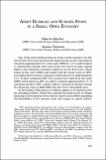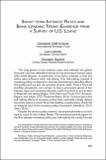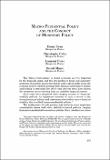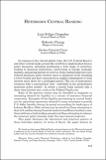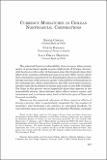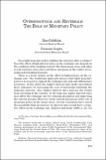Buscar
Mostrando ítems 1-8 de 8
Asset bubbles and sudden stops in a small open economy
One of the most striking features of the world economy over the last twenty-five years has been the sharp decline in the real interest rate from approximately 4% in the early 1990s to -1.5% in 2013 (figure 1). During this period there have been two waves of large capital inflows into emerging economies ...
The leverage cycle default and foreclosure
At least since the time of Irving Fisher economists as well as the general public have regarded the interest rate as the most important variable in the economy. But in times of crisis collateral rates (margins or leverage equivalently) are far more important. Despite the cries of newspapers to lower ...
Short-term interest rates and bank lending terms: evidence from a survey of U.S. loans
The long period of low interest rates that followed the global financial crisis has rekindled interest in how short-term interest rates affect bank behavior. In particular it has led to a debate on how low policy rates influence bank risk-taking. This risk-taking channel of monetary policy corresponds ...
Macro-prudential policy and the conduct of monetary policy
The 'Great Contraction' in global economic activity triggered by the financial crisis and the extraordinary fiscal and monetary measures that public authorities had to undertake in order to put the economy back on track by putting public finances under heavy strains and leading to extremely low ...
Inflation targeting in financially stable economies: has it been flexible enough?
The international financial crisis and Great Recession of 2008- 09 called for a range of significant policy measures by central banks beyond aggressive interest rate cuts. Measures have ranged from improving international coordination to purchasing local private loan portfolios and direct intervention ...
Heterodox central banking
In response to the current global crisis the U.S. Federal Reserve and other central banks around the world have implemented diverse policy measures including purchasing a wide range of securities lending to financial institutions intervening in foreign exchange markets and paying interest on reserves. ...
Currency mismatches in chilean nonfinancial corporations
The potential financial vulnerability that can occur when private sector or government agents acquire high levels of foreign currency debt has been at the center of discussion since the financial crises that affected the countries of Southeast Asia in the late 1990s. To the extent that a mismatch is ...
Overshootings and reversals: the role of monetary policy
Does tight monetary policy stabilize the currency after a collapse?. Does the effect of high interest rates on the exchange rate depend on the condition of the banking system? The East Asian crises and other recent currency crises have put these questions at the center of economic policymaking decisions.

